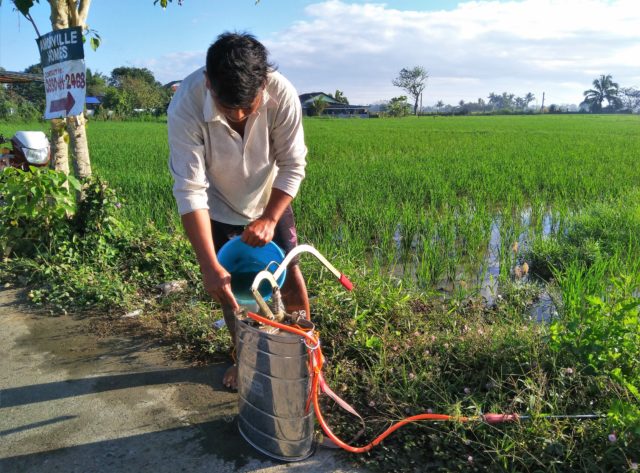A farmworker tends to a rice field in Cabanatuan City. Photo by Armand Galang
CABANATUAN CITY – Joseph, a 36-year-old farmworker from Barangay San Isidro here, starts his day by applying pesticide to the one-hectare rice field as the sun rises on Wednesday.
And that has become his routine since he started working at the farm, owned by his father-in-law’s compadre, for which he would get 10 cavans for every 100 cavans of harvest as a “porsiyentuhan” worker. “Ayos na rin,” Joseph said, but added any additional income would certainly make life better for his family.
“Dapat talaga ay madagdagan ang kita para mas makaluwag-luwag,” he said.
Joseph is one of about 8 million agricultural workers who, having no land, have been apparently left behind in the implementation of the P10-billion Rice Competitiveness Enhancement Fund (RCEF) after two years of Rice Tariffication Law or RA 11203, according to Nueva Ecija 3rd District Rep. Rosanna Vergara.
“Sa loob ng dalawang taon, naniniwala ako na ating napagtagumpayan ang layunin na maiwasan ang kakulangan ng bigas sa ating bansa. Hindi rin maikakaila na kumpara sa ibang mga pangunahing bilihin, napanatili rin na abot-kaya ang presyo ng bigas sa mga pamilihan,” Vergara said in her privilege speech on Monday, Feb. 15.
But Vergara expressed doubt on the RCEF’s impact on the farmworkers who, by her approximation, comprised the big chunk of players in rice production with some 8 million out of a 10 million total.
“Mahalagang ating pagnilayan kung nagtagumpay din ba tayo na palakasin ang sektor ng pagsasaka sa pamamagitan ng batas na ito, partikular sa epektibong pagpapatupad at tamang paglalaan ng RCEF para sa mga tunay na nangangailangan dito,” she said.
Under the RA 11203 that was approved in February 2019, at least P10 billion from the tariff imposed on imported rice will go to RCEF of which 50 percent goes to machineries and equipment to be distributed by Philippine Center for Post-Harvest Development and Mechanization (PhilMech), 30 percent for rice seed development, propagation and promotion,” under Philippine Rice Research Institute (PhilRice), 10 percent for rice credit assistance through Land Bank of the Philippines and Development Bank of the Philippines, and 10 percent for rice extension service undertaken by the PhilMech, PhilRice, Agricultural Training Institute and Technology Education and Skills Development Authority.
“Sa puntong ito, mainam na banggitin ko na ang mga kasama, at mga manananim ang kumakatawan sa mas nakararaming bahagi ng sektor ng pagsasaka at sila rin ang bumubuo ng nakararamingf kapus-palad nating mga kababayan,” the solon explained.
‘Barok’
On top of them, she added, were the “business people who have access to capital” who rent the land of poor landowners who hire farmworkers to work for them and the “landowners” who actually owned lands. These two types, she noted, are the ones referred to as farmers under the law, while the so-called “baroks” or “kasama” are the farmworkers.
Section 14 of RA 11203, she said, provides that farmers, farmworkers, and their families shall benefit from the law. “Subalit, ayon sa mga salaysay ng mga maliliit na magsasaka sa aking probinsya ng Nueva Ecija, tila ang totoong nakikinabang ay ang mga maykayang mamumuhunan, landowners, at malalaking kooperatiba na bumubuo lamang ng maliit na bahagi ng kabuuang pwersa ng pagsasaka,” Vergara added.
She urged the Department of Agriculture to probe reports that a few huge cooperatives who employ lawyers and accountants cornered equipment and credit facilities while small associations who can hardly deal with documentary requirements were left behind. There were also reports that machines from government were being politicized. “Nalaman ko rin na may mga makinaryang pinupulitika at pinahihiram lamang sa mangilan-ngilan at hindi sa lahat ng miyembro.”
The Nueva Ecija legislator also expressed alarm over reports that some RCEF beneficiaries turned out to be importer themselves. “Alarmingly, it was reported that there were 29 farm cooperatives in the top 50 companies that imported rice in 2019 while in 2020, 18 out of top 50 rice importers were farm cooperatives,” she said. Quoting Sen. Cynthia Villar, Vergara said:“Unscrupulous rice traders take advantage of the tax benefits given to farmer cooperatives to evade tariffs.”
Vergara further called on the DA to look into reports that local officials in Nueva Ecija allegedly use RCEF programs for political gains.
While the law has been enough by substance, she said, more “safeguard measures” should be undertaken to make sure RCEF will go to intended beneficiaries.
“The DA and the DSWD must work towards effectively harmonizing and cross matching of the RSBSA (Registry System for Basic Sectors in Agriculture) and the “Listahan” in order to ensure that the list is up to date. This also ensures that the poor farmworkers and their dependents are properly identified and targeted by the programs of the RCEF,” she explained.
In a separate public address, Vergara said farmworkers may themselves form cooperatives to qualify for machineries and other facilities under RCEF. They may offer such machines for rent as livelihood, for one, she added.





